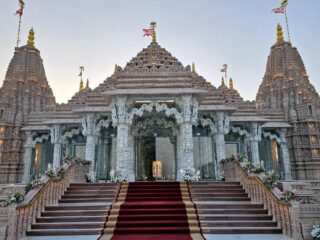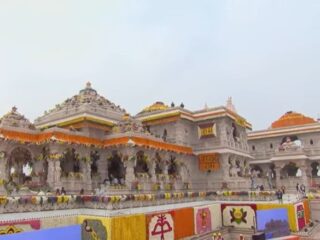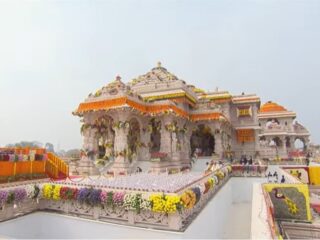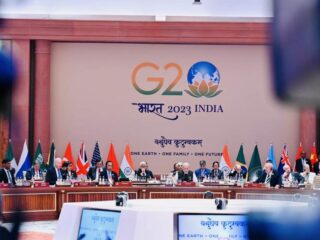Asghar Ali Engineer
(Secular Perspective March 16-31, 2009)
As long as my memory goes I remember Muslims in general and Indian Muslims in particular, have been criticized for being extremists in religious matters and though, the criticism went, there are a few moderate Muslims, they do not take any stand or refuse to stand up and be counted and always, extremists carry the day. This has been an unending criticism of Muslims.
It is not that in the past there were no extremists among Hindus. But they were not so visible and the intellectuals as well as the media thought that they were liberal and that there may be, of course a few exceptions. Also, Hindu liberals, unlike the Muslim ones, were not afraid of taking a stand. These attitudes were, least to say, historical, apolitical and static. Liberalism and extremism are not, and cannot be, eternal categories, as often assumed.
Human attitudes cannot remain permanently frozen in one or the other category. One has to take a dynamic view of the society, as in any society new realities keep emerging. An extremist today could become a liberal tomorrow and a liberal today may turn into an extremist in the coming days. It also depends on political conditions. A politically dominant community is more likely to be liberal than a politically suppressed and marginalized community.
It would be wrong to assume that historically Indian Muslims have been, or at least the dominant trend among them has been, conservatism or extremism. Indians are inheritors of a very rich syncretic culture, which would not have been possible without liberal trend among Muslims. In fact in any religious community there are multiple trends coexisting in any historical epoch. It depends on our politics as to which trend we choose to highlight.
Sufis have contributed richly to our sycretic culture and to Indian Islam. In fact sufi Islam has been a dominant trend in India, Throughout the medieval ages several regions like Kashmir, Sindh, Kutch, present regions of Karnataka, Punjab and parts of present day U.P. and Rajasthan, were highly influenced by sufi culture which was moderate open and liberal. Even places like Ayodhya and Varanasi had pockets of sufi culture. Dara Shikoh translated Upanishads into Persian sitting in Varanasi.
But communal propaganda deliberately ignored this dominant trend and chose to highlight the role of certain kings like Mahmood Ghazni, Aurangzeb and others so as to derive political advantage. The partition of India, which itself was the project of a section of elite Muslims to retain their political domination, worsened the matter and Muslims, in majority political parlance came to be associated with fanaticism and extremism. And the few liberal Muslims they spotted were also condemned as cowards, unable to take a firm stand.
As stated above extremism is a product not of religion but of political conditions, Hindu extremism emerged as a strong trend since mid-eighties of the last century when, due to the emergence of lower caste Hindus, domination of Brahmanical strata came under severe threat. Today Hindu extremism of RSS, Bajrang Dal, VHP and BJP itself is a well-known phenomenon.
I need not dwell upon the spread of this extremism. Minorities are its target and hundreds of citizens have become the target of its wrath. Narendra Modis, Bal Thackerays, Singhals and Togadias are dominating political discourse among Hindutva leaders. Even hundreds of journalists and intellectuals show contempt for democratic discussions and basic freedoms. It is not that only minorities suffer from this intolerant attitude. Hindu secular and liberal elements are too their target. Mr. Singhal of the VHP threatened Navin Patnaik when he broke alliance with BJP.
A journalist who claims to be quite fair and objective and keeps on criticizing Muslim fanaticism and often enters into discussion with me wrote to me the other day and mark his words: “who is this rascal Babar to invade India….” This journalist publishes a column regularly in one of the weeklies and keeps attacking Islam. Thus it will be seen that fanaticism or extremism is not a religious but political and social phenomenon and is found in all religious communities of the world; be they Hindus, Buddhists, Jews, Christians or Muslims.
Indian Muslims do have their quota of extremists and fanatics. But today in the given conditions, extremists and fanatics are increasingly being pushed aside, especially in the post-Babri demolition period. A section of Muslim political and religious leadership showed extremist attitude during the Shah Bano and Babri Masjid-Ramjanambhoomi controversy. They adopted a confrontationist political attitude during those days harming the cause of Muslims.
However, demolition of Babri Masjid and the communal carnage of Muslims that followed in Mumbai, Surat and several other cities, marginalized them. They learnt a lesson at a heavy cost and began to adopt moderation in their attitude. The Hindu militancy totally subdued them. Muslim masses began to shun extremist leaders and a section of religious leaders too got the message.
Darul Uloom, Deoband, an important Islamic institution, has always played important role in Indian Islam in late nineteenth century onwards and came out sharply against partition of the country and has adopted even more moderate position of late. It is reflected in a series of sensible fatwas it has issued recently.
When a controversy arose about cow slaughter, especially on Baqar Eid day when Muslims sacrifice animals, Deoband issued a fatwa that it is not obligatory on Muslims to sacrifice cow and Muslims should avoid sacrificing cow on the day of Baqar Eid. It was a very constructive attitude and with view few exceptions, Muslims generally followed it. Similarly, recently when Mr. Singhal of VHP demanded that Darul Ulum declare India to be Darul Aman, Maulana Mahmood Madani readily declared India Darul Aman silencing Mr. Singhal. It is a different issue that Mr.Singhal may now raise some other demand. Time alone will show as what to the next demand he is going to come up with.
Also, Darul Ulum Deoband has strongly and unequivocally condemned ‘jihadism’ of Muslim extremists and militants and Maulana Madani has denounced it as fasad, not jihad. Fasad which is also used in Hindi/Urdu, means corruption, disorder and bloodshed. Thus it was an apt description of ‘jihadism’ of these politically motivated actors. The Jami’at-ul-Ulama-i-Hind held huge rallies against so called jihad and denounced it in no uncertain terms. It was once again a very constructive role played by Jami’at as they had played during partition movement.
These rallies against ‘jihadism’ have sent a very clear message to Muslim masses in India not to support directly or indirectly such killings by invoking religious doctrine much misunderstood and corrupted in political sphere. These rallies are still continuing, though they are not always covered by the mainstream media.
Recently Darul Uloom has issued yet another fatwa after the general elections were announced which is quite helpful for secular democratic values in India. The fatwa says that Indian Muslims should vote but not on the basis of religion. The fatwa further says, “The vote should not be kept back. One should vote for the party and the leader that is better and works in favour of Muslims and the country. India is a secular democratic country. Hence it is out of place to look at its politics in Islamic perspective and test the parties and political leaders on Islamic principles”, the fatwa says. This is yet again a constructive approach to promote secularism and secular values in the country. Today our voting takes place blatantly on the basis of caste and religion. One hopes Muslims will follow this sensible advice.
It should also not be construed to mean that there are no other trends among Indian Muslims. There are extremists and militants, for sure. However, this moderate trend is emerging as a very important trend and is represented by one of the most prestigious Islamic seminaries in India. It is also to be noted that even this seminary continues to be quite rigid on certain other questions like women’s rights etc. But it is a different question.
This fatwa, along with others referred to above, sends an important message to Indian Muslims: it is secular democracy which ensures peace security and progress and that religious extremism and extremist politics based on that is totally destructive of all human values. Let us remember it is secular democracy, which has cemented our unity across religions, languages and cultures. Extremism has always tried to weaken it be it Muslim extremism or Hindu extremism.
Again I would like to emphasize that we should not take a static view of society, as society is ever changing and frozen attitudes on our part will not help us understand the complex and dynamic reality objectively. A social scientist should ever be conscious of these changes taking place around us. That will help break our prejudices and help understand each other better.
___________________________________
Centre for Study of Society and Secularism
Mumbai.




